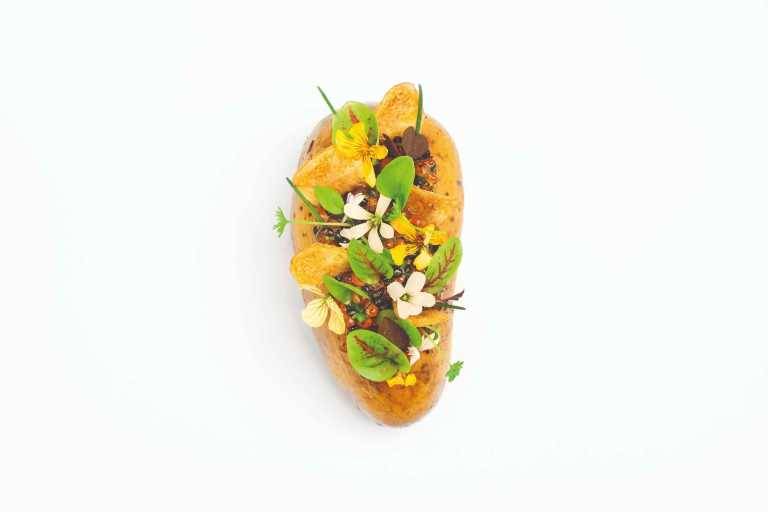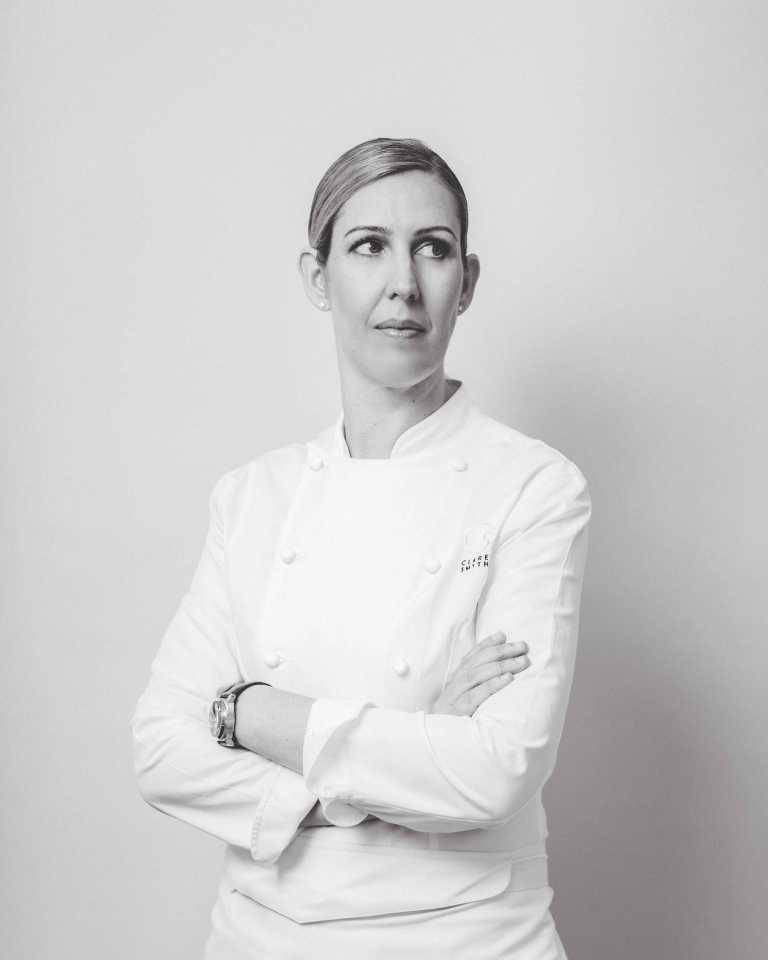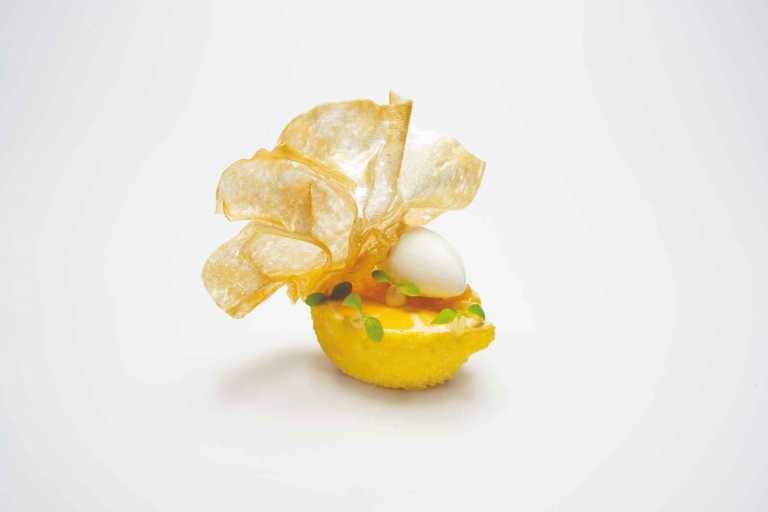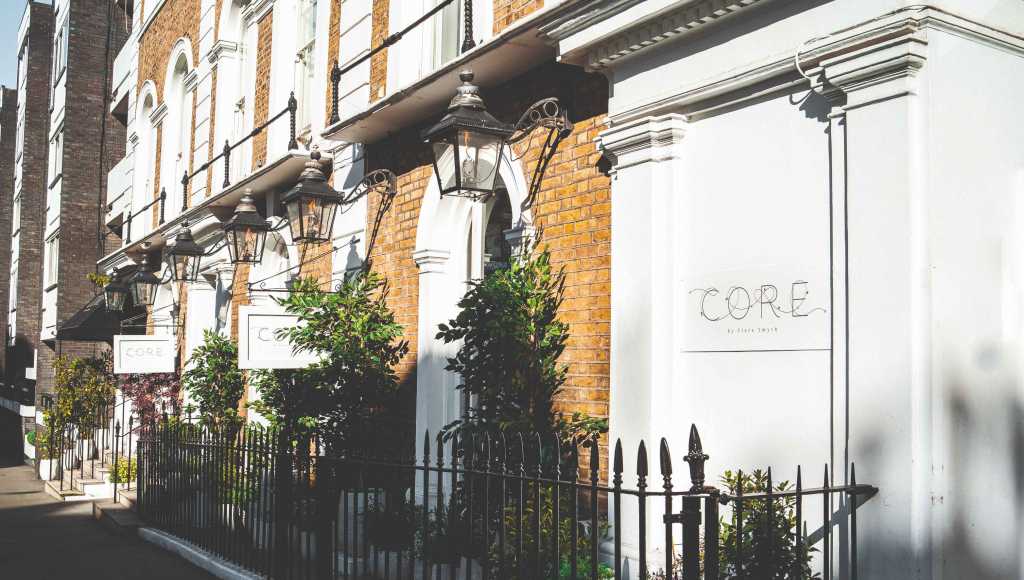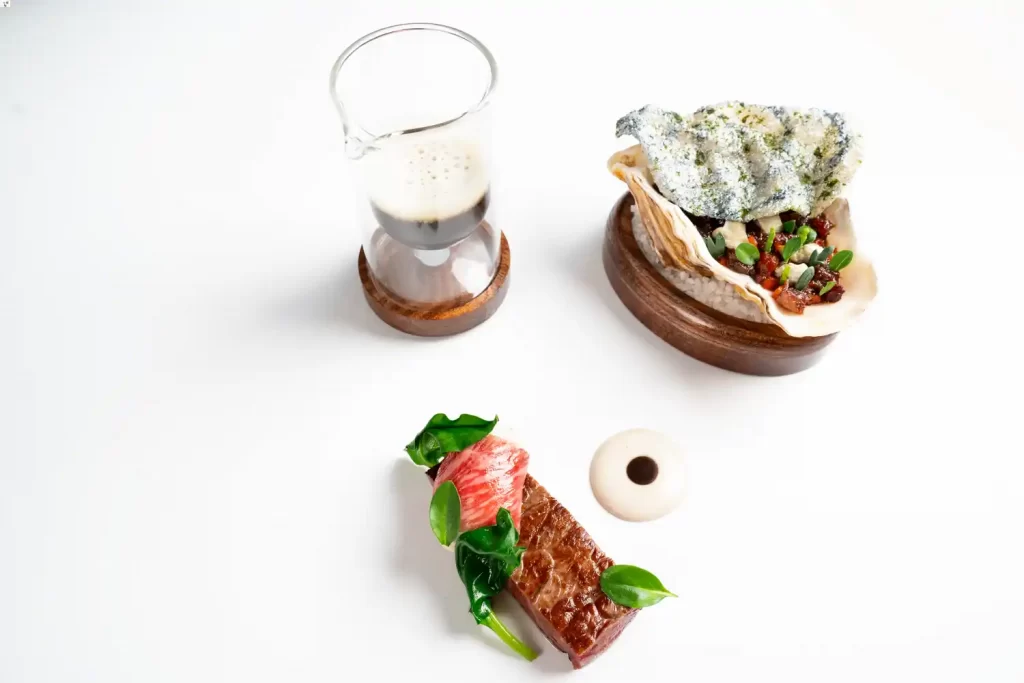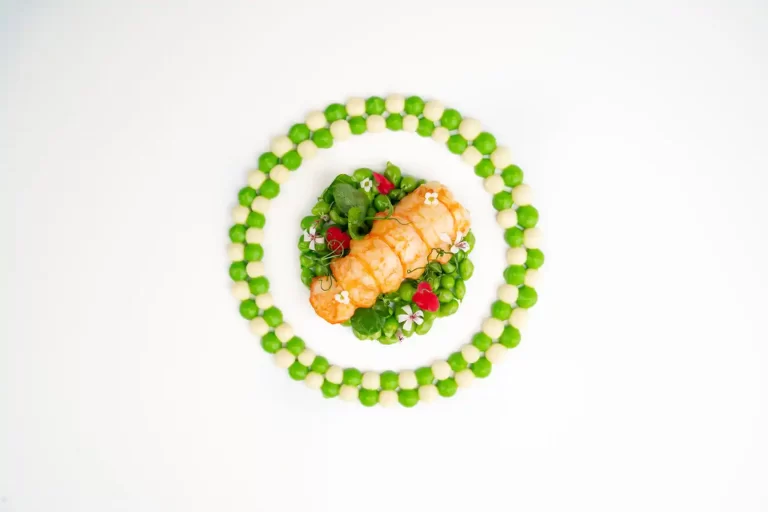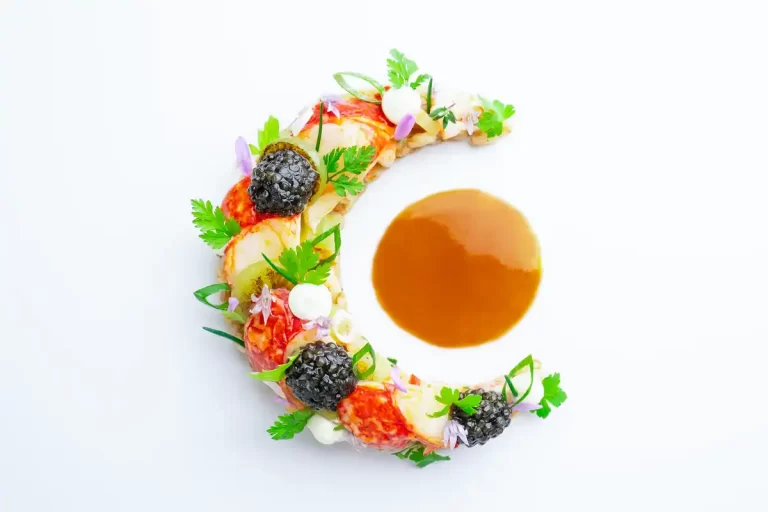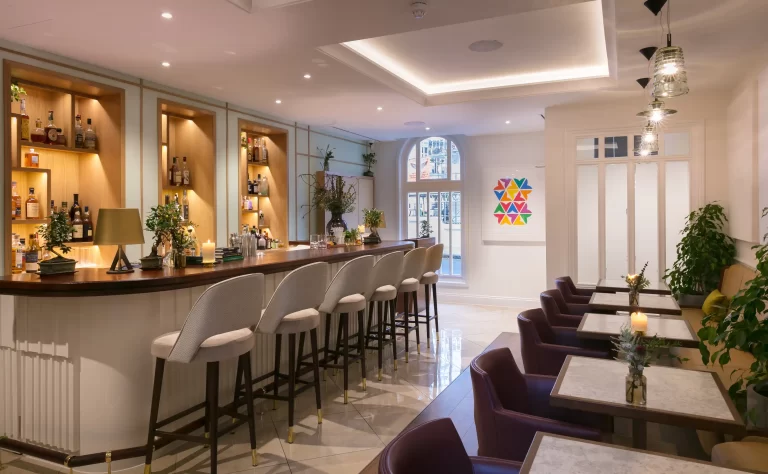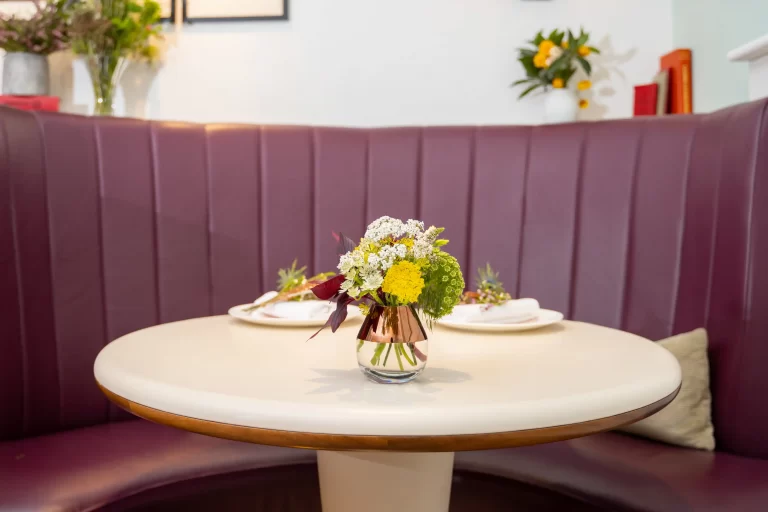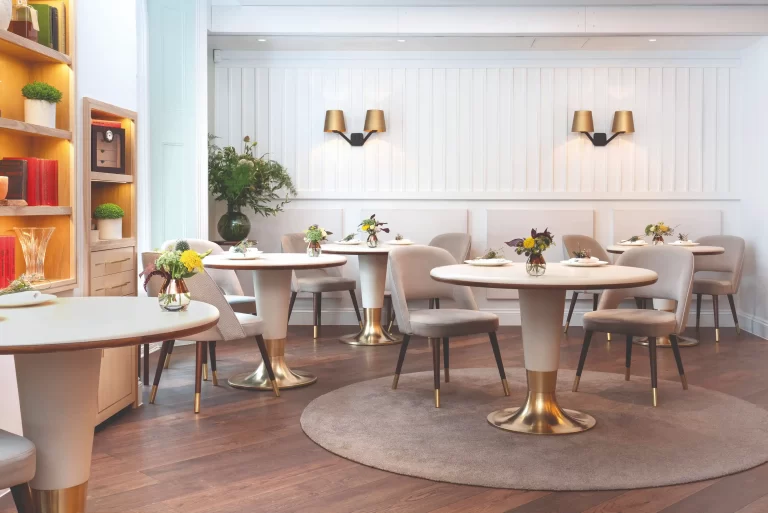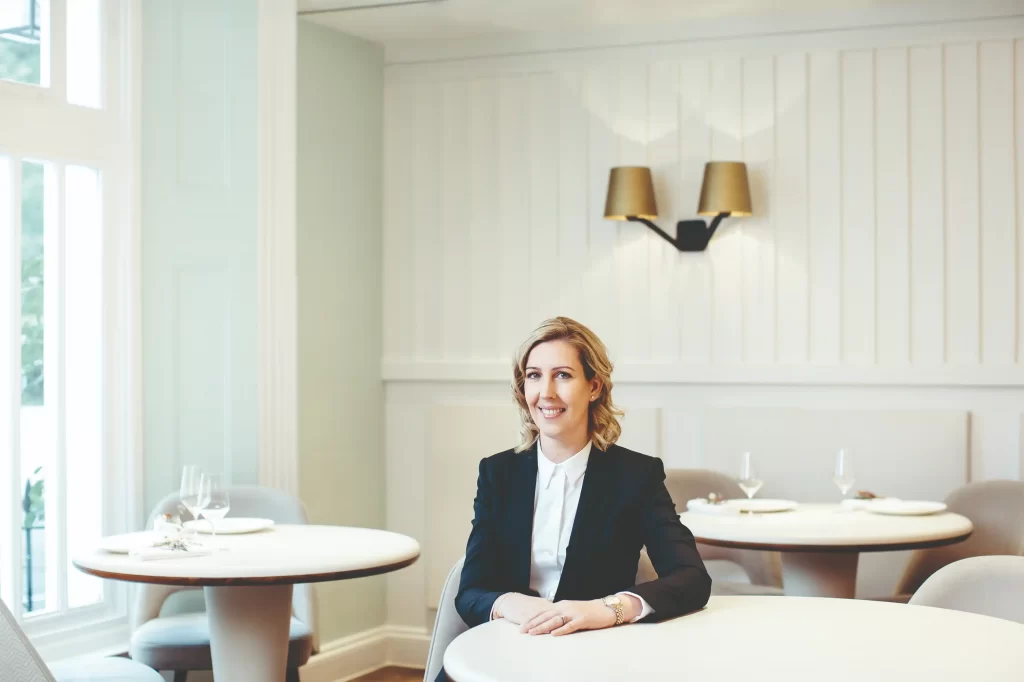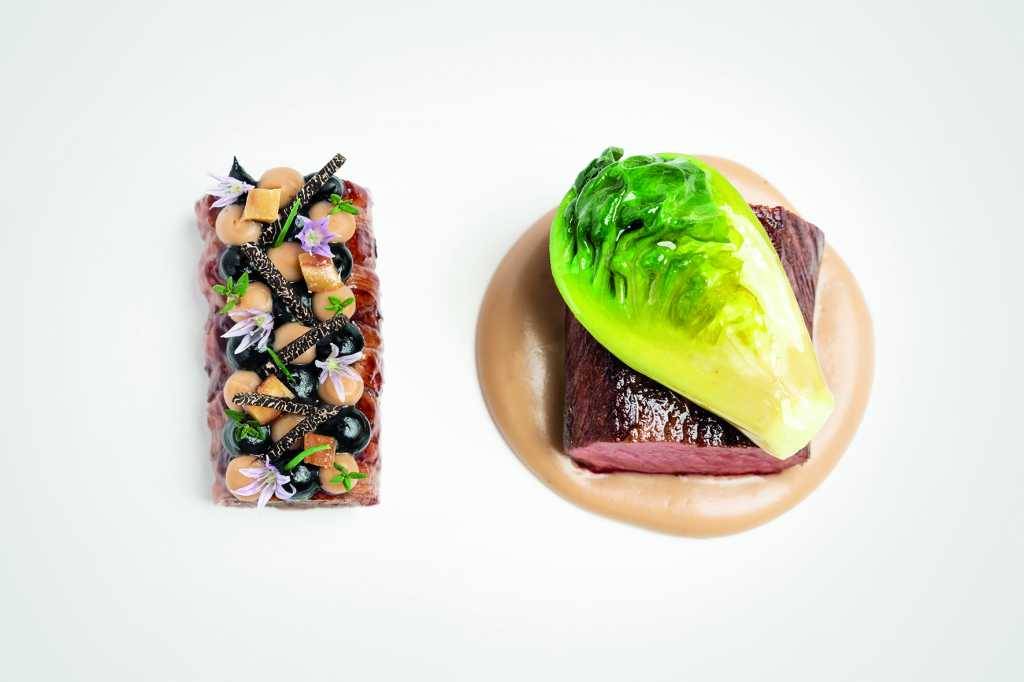From humble beginnings to building a world-class home of gastronomy, Clare Smyth is paving a path of culinary excellence unlike any other. Focused on her community, her goal is to cast new light on British cuisine that honours her native roots. Britain may not have always been known for its fine food, but Clare is dead set on changing the nation’s culinary narrative.
Growing up on her family’s farm on the coast of Northern Ireland in County Antrim, food and produce have always been part of Clare’s DNA. As a teenager, she took her first summer job working in a local restaurant, and the moment she stepped foot in the kitchen, her passion for the culinary arts peaked. At the age of 16 she left school and moved to London, dedicating her life to culinary excellence.
“When I entered the kitchen, I knew that this is where I was meant to be. I had the opportunity to do management and hospitality courses, but this wasn’t my interest. I wanted togetintothekitchenandcook.That’sit.Soonedayaweek I would spend doing culinary classes, and the rest of the time I was in the kitchen.”
As a young chef, Smyth was cunning and calculated, making smart choices from the start. She knew that to be the best, she had to learn from the best, and so she set to work. From Sydney to New York and Monaco to London, Clare whirled her way through the globe’s top kitchens, honing her skills and soaking up oodles of knowledge.
Her star-studded career kicked off at London’s Bibendum, now owned by her close friend and renowned chef, Claude Bosi. This was her first introduction into fast- pasted, fine-dining kitchens, and she learned a lot about the industry here. But this wasn’t Clare’s most formative culinary experience, she admits. It’s the fiery pit of Restaurant Gordon Ramsay that she credits as having the biggest impact on her culinary journey.
“Gordon Ramsay’s kitchen was all about the skillset, the precision, which is something that I still keep with me to this day at Core. This meticulousness is what makes kitchens of that stature work, and that’s why Gordon has successful restaurants all over the world. It’s also why technique plays such a large role in my kitchen.
“On the other hand, when I went to work with Alain Ducasse in Monaco, everything there was more focused on produce. We were situated in a region where we had access to the most amazing ingredients, and so we worked to showcase them as best we could. In most cases, simplicity was better than complexity, and it was about finding ways to let the essence of these ingredients shine. This is where my passion for produce really ignited, and this idea of respecting the purity of ingredients is something I still carry with me to this day.
“While working at Le Louis XV in Monaco, I always used to think to myself how impactful what we were doing was. Within an incredible venue, where the most affluent guests frequented, we were able to serve beautiful, simple cuisine that was created with intentional restraint. Even now, at Core, exercising restraint is one of the biggest challenges in my kitchen. It’s really difficult to know when to stop, when enough is enough.”
This challenge is one that Clare faces head-on with her development team when they create new dishes. Giving each new idea the attention it deserves, the menu is only changed one dish at a time – a process that could take days or even months, in some cases.
“When we develop dishes, I call up Antonio, my development chef, and we speak about the product, what we can and want to do with it, and then we get to work, trying everything and anything. He researches more about it, sharing interesting tidbits about the product that I would never have known. But when we get to cooking it, it’s more about a process of elimination, seeing what works and what doesn’t. Sometimes the process is quick and sometimes it can take forever. Of course, sometimes it never works and the dish doesn’t make it to the plate.”
There are various factors at play behind the process of dish-creation at Core, but all of them wholly reflect Clare’s ethos of highlighting the best of British produce. Endless research goes into finding the ingredients used, many of which have intriguing stories behind them. Often, the ingredient’s backstory is what piques the chef ’s interest most, and honouring this is what drives the dish’s execution.
I often talk about the potato and roe dish, which is a signature and very special to, me because my aunt and uncle were potato farmers. We often helped out on their farm digging and seeding potatoes, and we grew up eating potatoes every day with every meal. But what’s also special to me about this dish is the fact that the potato is an ordinary ingredient, and I set out to do something extraordinary with it.”
Featuring a humble potato poached in seaweed, served with smoked herring and trout roe and salt-and-vinegar potato crisps, this storied dish bellows with sentiment. Using seaweed is intentional, and is done to pay homage to the potatoes her aunt and uncle used to grow, which inherited a unique minerality from their vicinity to the ocean – something she wanted to replicate. The roe is also a nod to her childhood spent by the coast, and is used in place of caviar for a better texture contrast with added flavour.
The foundation of every dish on Core’s menu has the same building blocks: a careful construction that pieces together the best in flavour and texture, without forcing the use of traditionally luxurious or expensive ingredients that come to be expected at Michelin-starred restaurants. Having learned her skills in top-class French kitchens, she is still technique-focused, however, and brings her flawless dishes to life in a poetic, often playful way.
“I don’t like to use expensive ingredients for the sake of using expensive ingredients. I want to surprise and push the boundaries with my dishes, and they have to tell a story, too. For example, there’s this new oyster-and-beef-pie dish on the menu, which has origins from the Victorian era. Back then they would use surplus oysters, which were cheap and in abundance, and jam-pack them into a pie. Fascinated by this idea, I took to reinterpreting it for a dish that would pay homage to our ancestors while showcasing the best British produce. We also source the beef for this dish from an incredible farmer in Scotland who has shown an impressive entrepreneurial skill, working hard to produce premium highland Wagyu beef that we can now source locally.”
“I want to spotlight local ingredients – that’s my main goal. I have this amazing team, and they work tirelessly with me in our quest to bring British cuisine to the forefront. We have farmers in the Lake District that we really need to keep alive, or else it will be a very sad loss for the industry.
I’m all about paying a fair price so that the farmers and small-scale producers can continue on their work – work that they have been doing for generations, in some cases. I work with producers that have the same values as I do, fostering a community and a connection. These people are my friends and colleagues that I have the greatest respect and admiration for. Their stories are stories that I want to share to diners through my food.”
“This is why it became so devastating when Covid-19 hit, because this heavily impacted the farming industry. My friends, who had crops ready to go – a process that takes months and years, and cannot be halted – were stuck with so much surplus food and nowhere to send it. It was heartbreaking when we would talk to our suppliers over Zoom, and they would show us the mounds of produce lying around that they didn’t know what to do with.”
“At Core, we went from using 200 ducks a week to not using any, so we knew we had to try help our farmers and be creative with the produce. One of the things we tried to do was to make duck ham – curing the meat we couldn’t use in an attempt to preserve it. We also dabbled in the idea of takeout for our long-standing customers, but it wasn’t our focus. Our focus was helping our community. What we did in the first lockdown was work with a few charities, children’s homes and hospitals that we would cook for using the excess produce. It was really touching to have the people we were supporting come and collect the parcels of food, to see and know that we were making a difference.”
“I know people say they want to go back to the new normal, but I want the old normal back. To hug my long- term guests-turned-close friends, to welcome diners back with open arms. The thing about the fine-dining industry is that it will never die out. If anything, it may come back with a vengeance, being more popular than before. People will be selective with what they want, and restaurants are a place people can go to feel treated.”
For Clare, this concept of pampering her diners has always been at the heart of her approach. At Core, the haughtiness of haute cuisine is left at the door. Instead, guests walk into a space that Smyth calls her home of gastronomy, where everything has been purposefully handpicked and specially designed to evoke a sense of geniality and comfort – from her personal items that line the shelves to the open kitchen.
“For the restaurant’s interiors, I was not concerned about labels. Instead I wanted to go out and get everything that was authentically British, from the tables to the chairs to the cutlery. During the industrial revolution, British steel and fine bone china played a major part in the economic growth and success of Britain. It is an important part of our history. So I really wanted to work with British companies to produce quintessentially British tableware for Core.”
This idea of her restaurant being a chef ’s home, where hospitality reigns supreme, is what Smyth sees as her greatest draw and a main element that has led to her success. The warmth and the welcome that guests feel is what they will remember after their visit, and this is paramount to the dining experience at Core.
“The playlist is very integral to this feeling, and all the music played is my music. I love pop culture. I am living in this time – we all are – and we need to embrace that. I want people to walk out remembering this hospitality. Chefs often get lost, almost obsessed with the idea of food, but they should be thinking about the customer, too. They forget about the person who is eating the food, what they will enjoy and how they will enjoy it. Of course, it’s about skill and flavour, but it’s also about how these are brought together in the bigger picture. It’s about the experience as a whole: the food, the music, the wine, the decor and catering to what people like. Everyone has their preferences, what makes them happy, and at Core, we try to highlight exactly that.”
Find out more about Clare and restaurant Core at www.corebyclaresmyth.com
Images:
Core by Clare Smyth & Food Story Media Ltd

